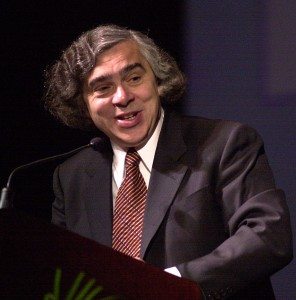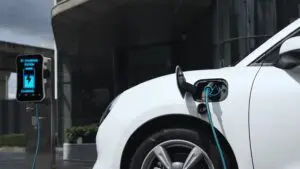President Obama nominated MIT physicist Ernest Moniz as Secretary of Energy to replace outgoing Steven Chu. In his announcement, Obama called Moniz a “brilliant scientist” who “knows that we can produce more energy and grow our economy while still taking care of our air, our water, and our climate.”
Here is where the nominee stands on the most important energy issues:
Climate Change and a Price On Carbon: According to the Washington Post, Moniz is “alarmed about climate change and devoted to funding scientific research into low-carbon alternatives to fossil fuel.” In a video interview, Moniz said, “What I believe is if we squeeze down on carbon, we squeeze up on cost, and it brings along a push toward efficiency; it brings along with it a push toward clean technology; it brings along with it a push toward security,” he said. A 2011 MIT gas study calls for greenhouse pollution reductions greater than 50 percent.
Energy Efficiency: A sign the DOE will continue to prioritize energy efficiency is Moniz’s own words on the topic. “The most important thing is lowering your use of energy in ways that actually save you money,’ he said. ‘It sounds trivial, but putting out lights really does matter.”
Solar Energy: He describes himself as “bullish” on solar energy. According to Solar Freedom Now, “He ‘gets’ the practical realities of solar R&D,” and has advised a number of solar finance and technology companies.
Nuclear Energy: Moniz has been embraced by the Nuclear Energy Institute, a lobbying group, for his long-time support of the industry. In 2011, he wrote that it would be a “mistake” to allow Japan’s nuclear disaster to “cause governments to abandon nuclear power and its benefits” due to his belief that nuclear power can be a partial solution to reducing our greenhouse gas emissions in the long-term.
Natural Gas: Moniz wrote that “natural gas truly is a bridge to a low-carbon future” in an academic report. He favors its use as “bridge” to transition to renewables: “For the next several decades, however, natural gas will play a crucial role in enabling very substantial reductions in carbon emissions.” But Moniz also warned that natural gas could slow the growth in clean energy.
Fracking: The Energy Department would have no jurisdiction over fracking policy even though Moniz supports the controversial drilling technique. Moniz has been criticized for a pro-fracking MIT report bankrolled by oil and gas companies. However, the MIT study also supports mandatory disclosure of fracking chemicals.
Some groups, such as Public Citizen and Food & Water Watch, have criticized Moniz over his support for natural gas and hydrofracking, since neither are particularly good for the environment or climate. According to The Hill, none of the largest environmental organizations opposes his nomination. The Sierra Club expressed hesitancy that “an ‘all-of-the-above’ energy policy only means more of the same.”
Following Obama’s announcement, Natural Resources Defense Council released a statement of support that said, “Professor Moniz has the hands-on experience and the expertise needed to help further the climate and energy goals our country urgently needs. His background, coupled with his long history of constructive engagement with, and at, the Energy Department, will serve the American people well.” Republicans like Sen. Lisa Murkowski (R-AL) also back Moniz’s nomination, calling him someone “we could work with.”
ThinkProgress War Room Senior Climate/Energy Researcher Tiffany Germain contributed research to this post.
This article was originally published on Climate Progress. Reproduced with permission










